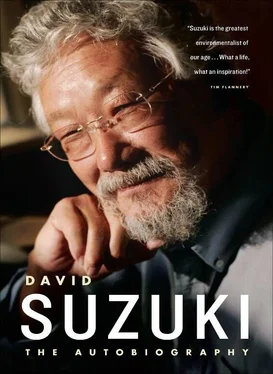Two tragedies in a week were a lot for a small community to bear. After we had been in the village for some time longer, I woke in the night to shooting and yelling outside. It sounded as if people had been drinking and were now shooting wildly, though we had not seen alcohol or guns during our stay. Tara and I got up, and as we went to the door of the hut, there was Paiakan as if standing guard. “What's wrong?” we asked. He looked very grave and pointed to the full moon. “The moon is sick,” he said, “and my people are frightened. They blame it on brancos [white people].”
I had no idea whether he meant that the conjunction of the two tragedies earlier in the week, and now the moon, meant we were being blamed, or whether it was Brazilians in general who were being held responsible for the disasters. We looked at the moon, and it was a strange orange-brown color with blotches on it. “Is it an eclipse?” wondered Paiakan. We couldn't tell; the moon looked distinctly odd.
“The people are chanting the moon back to health,” explained Paiakan.
“Are we in danger?” Tara asked.
I expected him to reassure us, but his answer was, “ Não sei [I don't know].” Now that worried us.
“Do you think people will calm down?” Tara persisted.
Again the chilling answer came back, “ Não sei .” Patricia, Miles, Severn, Sarika, and I could claim “we're not brancos!”, but Tara says she felt her white skin shining out of that hut.
What were the odds of going to the heart of the Amazon at the same time a lunar eclipse would occur? An hour later, Tara looked out and saw a clean white moon, a telltale bite out of one side. To the Kaiapo, such an extraordinary occurrence is filled with significance, indicating the order within their world has been disrupted and somehow has to be set right. Could these “signs”—the deaths and the eclipse — be punishment for something they had failed to do, or a portent of something extraordinary to come? In a worldview in which everything is connected to everything else, these occurrences cannot be dismissed as meaningless.
Thoughts surged through my head. The Kaiapo are famous for their ferocity. In 1990 two Kaiapo parties of warriors attacked illegal settlements in their territory and claimed to have killed thirty peasants; Raoni, Sting's friend with the plate-sized labret, had led one of the parties in Xingu National Park. In Gorotire, I had met a Brazilian nurse who loved the Kaiapo. She had been living in one of the villages for twenty years when a rumor spread there that white people had attacked a Kaiapo in Redenção. The villagers were so infuriated that they went after the nurse, who had locked herself in her hut. She laughed as she recounted the incident, but she had warned me: when there is a crisis, it doesn't matter how well received you've been; you are not Kaiapo.
Now, I have a curious trait. When confronted with an emotionally charged situation, I become sleepy. It seems to be some kind of defense mechanism, perhaps a way of avoiding further anxiety. In any case, I felt there wasn't much we could do but wait it out and hope things would be calm by morning. Normally I'm the worrywart, but I climbed into my hammock and went back to sleep. Tara lay there listening to bullets whiz past our thin mud walls. Boy, was she mad at me. But we survived.
Morning came. The girls woke up unaware of what had gone on. We ventured out cautiously, wondering what would happen. Superficially, life seemed to be normal as people went about cooking, fishing, swimming. We couldn't decide whether it was our imagination or whether the people were cooler toward us. Our idyllic stay in Aucre had come to a crashing end. We had planned to stay for a few more days, but some of the joy had gone out of it, displaced by our ignorance and fear.
When Paiakan announced that the plane was coming in to take him and Irekran and their children out of Aucre, we decided to leave too. This had been an experience of a lifetime, a step back thousands of years in time to the way humans have lived for most of our existence. We had reached across that huge chasm in friendship and had been accepted in return, yet the eclipse had brought each side back to the reality of how differently we perceive the world.
We had to lighten our packs for the plane and gave away T-shirts, flashlights, fishing gear, knives, whatever we felt would be useful. A young man who had hung around me on our fishing trips shyly gave me a feather necklace he had made. As we left, I didn't know whether the ritual weeping was just for Paiakan and Irekran or whether the Kaiapo also liked us and were wishing us the best.
Severn and Sarika didn't want to leave. It had been an enchanted experience for them, and they wanted to stay the full shot. But once again we were airborne, leaving Aucre and passing over that immense expanse of green.
After forty minutes, we passed a brilliant slash of red through the forest — it was a placer gold mine, and the destruction of the river was unbelievable. The water looked a foamy cream color. Soon we began to see smoke, at first small wisps here and there and then large plumes that blocked the sun — this part of the forest, home to the Kaiapo, was on fire. Sev, especially, became very agitated to realize her friends' habitat was being destroyed.
We stayed overnight in a motel in Redenção. In Aucre, money meant nothing. There, life depended on the skills and knowledge of the people, and the forest and rivers were abundant and generous. Suddenly we were thrown into a world where money was everything. After the mud hut and the Kaiapo children underfoot and the swimming and fishing, even this small town seemed noisy, polluted, and inhospitable. After a sad farewell to Paiakan and his family — who knew when we would see each other again? — we caught a plane to Cuiaba for a short visit to the Pantanal, a wetland fabled for its birds and crocodiles.
As we flew out of Redenção, Sarika complained that her eye was sore. It was red and bloodshot, and within minutes, a thick, milky mucus began to pour out of it. It was terrifying to watch the speed with which this infection developed. By the time we arrived in São Paulo, en route to Cuiaba, her eyelid was swollen shut. We rushed to a drugstore in the airport, where the pharmacist looked at her. I had expected him to jump back and shout, “Oh, my god!” or something equally dramatic, but he indicated it was a common problem and calmly handed us a tube of medicine. I was dubious, but we squeezed the medication into her eye, and within minutes the swelling began to decrease. In a few hours, her eye was free of infection.
While we were waiting for Sarika's eye to subside, Miles began to mock me about the parasites I had pulled out of my feet. How many had I had? Why had I worn sandals? He heaped scorn on me because I should have taken better care of myself. “Do you mean you didn't get any?” I asked. “You don't have any sore spots?”
“Of course not. . ” he responded, then stopped in midsentence. He plunked himself down on a sofa, tore off his shoe and sock, then saw the volcano between his toes. “Take it out, take it out!” he wailed. I could only laugh at this brave Haida warrior.
PAIAKAN BECAME A GLOBAL hero for his battle to protect his home. He was honored and feted in Europe and the United States. In 1990 he was elected to the United Nations Environment Program's Global 500 list of world environmentalists and, along with former U.S. president Jimmy Carter, received a prize from the Society for a Better World. I flew to New York to celebrate the award with him.
In 1992, an Earth Summit drawing participants from around the world was to be held in Rio de Janeiro in June, and as the date approached, we prepared to return to Brazil. Paiakan's renown had grown, and despite being a thorn in the side of those who would develop the Amazon, he was expected to play a central role at the summit. I heard the Tibetan religious leader the Dalai Lama had asked to share the stage with him.
Читать дальше


![David Jagusson - Devot & Anal [Hardcore BDSM]](/books/485905/david-jagusson-devot-anal-hardcore-bdsm-thumb.webp)









